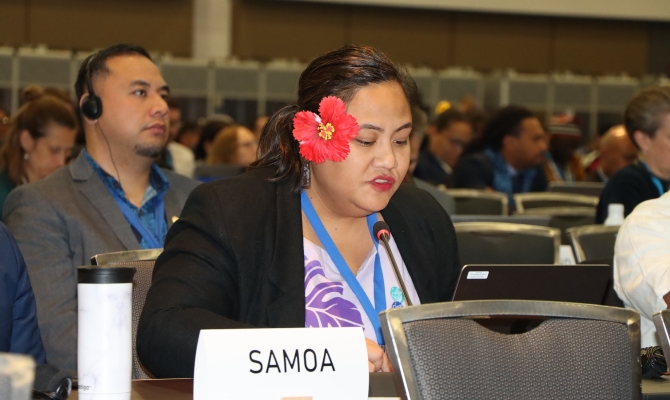
24 April 2024, Ottawa Canada - As officials and negotiators sift through the revised draft text of the international legally binding instrument on plastic pollution, including in the marine environment, the Alliance of Small Island States (AOSIS) has reiterated that the instrument must take into account the special circumstances of Small Island Developing States (SIDS).
The point was raised by Samoa, as the Chair of AOSIS, during opening plenary of INC-4 underway at the Shaw Centre, Ottawa Canada, from 23 to 29 April 2024.
The special circumstances of SIDS in relation to the triple planetary crisis of climate change, biodiversity loss and plastic pollution, refers to their small size and small economies which makes them inherently susceptible to external economic and financial shocks.
The plastic pollution crisis has placed Pacific communities at the forefront of impacts despite the region’s measly contribution of 1.3 per cent to global statistics.
Ms Kathleen Taituave, ACEO of Samoa’s Ministry of Natural Resources and Environment (MNRE), who delivered the statement, said AOSIS recognises the pivotal role the proposed agreement will play to address yet another environmental crisis SIDS are disproportionately affected by but contribute minimally to.
“It is well established that SIDS have special circumstances given our geographic challenges, limited resources and vulnerabilities to external economic shocks,” Ms Taituave said. “As SIDS we are on the frontlines of the triple planetary crisis of pollution, climate change and biodiversity loss, and the risks to our livelihoods, economies, health, and environment.”
Samoa reiterated AOSIS’s commitment to the work to develop an international legally binding instrument on plastic pollution, saying they welcome the revised zero draft as the basis for negotiations.
The revised zero draft being placed under the microscope in Ottawa is the result of three contact groups established during INC-3 in Nairobi last year, to consider the original zero draft, and a synthesis report on previously undiscussed elements.
The revised zero draft contains options for treaty text organised in five sections pertaining to: Primary provisions, including the preamble, objectives, principles, and scope; Management of plastic along its lifecycle, including primary polymers, product design, and waste management, as well as extended producer responsibility, trade, and existing pollution; Means of implementation, including financing, capacity building, and technology transfer; tracking implementation, including through reporting, compliance, and international cooperation; and Institutional arrangements, including governing and subsidiary bodies and a secretariat.
SIDS have repeatedly called for an ambitious, effective and equitable international legally binding Instrument that addresses a full life-cycle approach to end plastic pollution, including in the marine environment.
On Monday at the Shaw Centre, Ms Taituave told the INC membership that the agreement must be supported by new, additional, adequate, and predictable means of implementation.
“This must include a robust financial mechanism, which advances just transition and provides specific support provisions for SIDS, including priority access to fast tracked resources, technology transfer, technical assistance and capacity building,” she said.
“An effective instrument for SIDS means that there must be comprehensive regulation of hazardous, problematic, and avoidable chemicals and polymers used in plastic production, and plastic products, including single use plastics and microplastics - where the strength of the obligations should depend on the level of harm.
“We must also consider the possibility of cooperating and/or coordinating with existing relevant frameworks or conventions, as appropriate. Global harmonised standards in key areas will be essential to ensure high ambition, as well as inclusive and transformative actions by all.”
The reduction of existing plastic pollution is another key issue for AOSIS.
“For SIDS the instrument must include a mechanism for the remediation of existing plastic pollution in the marine environment, including in areas beyond national jurisdiction.”
The pressure is on negotiators to deliver an agreed text in Ottawa. According to the UNEA mandate, the treaty should be finished by the end of 2024 at INC-5 in Busan, South Korea.
To meet the ambitious deadline, AOSIS has repeatedly called for an effective intersessional work programme.
“At this critical juncture in the negotiations, and with our final session fast approaching, formal intersessional work is not just a consideration for SIDS, it is an absolute necessity to advance this process,” Ms Taituave said.
“AOSIS has developed and shared an intersessional work proposal to support further discussions on key areas. We look forward to engaging with members on this proposal in the coming days.”
After the opening plenary on Monday, contact groups and sub-groups have convened.
“We urge colleagues to utilise our time efficiently here in Ottawa to reach convergence on key elements that would drive meaningful progress toward Busan,” said Ms Taituave.
“SIDS remains committed to maintaining constructive and productive discussions on a future agreement that is inclusive, ambitious, equitable and innovative.”
Since 1990, AOSIS has represented the interests of the 39 small island and low-lying coastal developing states in international climate change, sustainable development negotiations and processes.
The fourth Intergovernmental Negotiating Committee to develop an international legally binding instrument on plastic pollution, including in the marine environment is taking place in Ottawa, Canada, from 23-29 April 2024.
The Pacific Islands are represented by the Cook Islands, Federated States of Micronesia, Fiji, Kiribati, Marshall Islands, Nauru, Niue, Palau, Papua New Guinea, Samoa, Solomon Islands, Tonga, Tuvalu and Vanuatu through the support of the Government of Australia and the United Nations.
They are supported by the Secretariat of the Pacific Regional Environment Programme (SPREP), working with partners the Pacific Islands Forum Secretariat (PIFS), Office of the Pacific Ocean Commissioner (OPOC), The Pacific Community (SPC), Forum Fisheries Agency (FFA), Environmental Investigation Agency (EIA), Centre for International Environmental Law (CIEL), University of Wollongong, WWF and Massey University.
For more information, visit: https://www.unep.org/inc-plastic-pollution/session-4